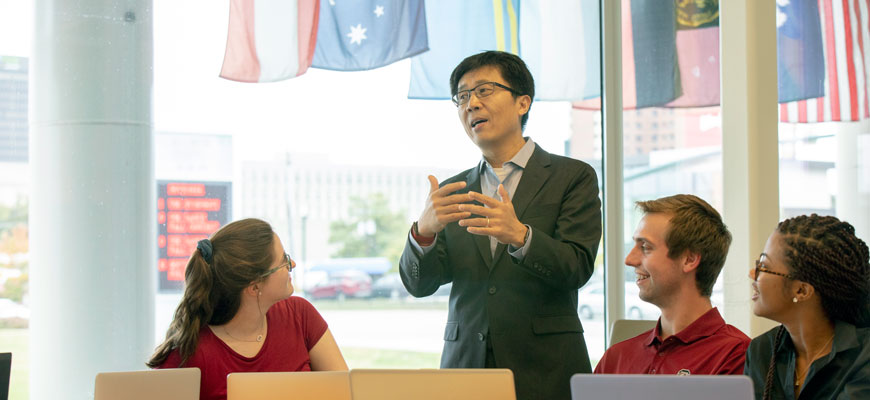
Helping SC business go global
Moore School created international business program 45 years ago to help SC businesses manage overseas investments
Posted on: October 15, 2019; Updated on: October 15, 2019
By Page Ivey, pivey@mailbox.sc.edu, 803-777-3085
When the Darla Moore School of Business launched the master’s in international business program in 1974, the motive was pretty straightforward: to address a need of South Carolina businesses by supplying highly educated professionals who could successfully manage investments outside the U.S.
Specifically, the program grew out of conversations between then-dean Jim Kane and two members of the Business Partnership Foundation — Hartsville, South Carolina-based packaging company Sonoco and Springs Industries, a textile company then based in Fort Mill.
“They had issues with overseas investments they had made that didn’t turn out the way they wanted,” says Randy Folks, distinguished professor emeritus and first director of the Moore School’s international department. “They needed people who understood international business for these overseas assignments.”
Folks and four other business professors put together a Master of International Business Studies curriculum that required a strong business foundation coupled with fluency in a second language. The third piece of the degree would be an understanding of economics and politics of different regions of the world. That last piece would include an international internship.
“We had to find those internships, then we had to get the countries to agree to take our students,” Folks says.
The initial program was quite rigorous — out of 40 students who started in the first MIBS class, only 20 graduated. Most of those who failed to complete the program were done in by the language requirement, which started with an intensive set of language courses over the summer before the students even entered the program. The language lessons continued throughout the first year, and the following summer the students would be immersed in the language with their internship.
My objective is to make sure that people are successful, and that requires constant innovation.
Kendall Roth, senior associate dean for international programs and partnerships
As interest in the program grew, applicants were better prepared for the rigors of the language and other nonbusiness requirements, Folks says. And the school added a component for foreign nationals studying here.
The program grew steadily throughout the 1980s and had its largest class in 1992 with 180 graduates. But toward the end of the decade, things began to change.
“We had been able to attract really bright people who didn’t have much business experience because we were going to give them an internship for six months, and that generated real value for the companies,” Folks says.
But around 2000, companies began looking for more seasoned business professionals who were going back to school after getting experience in the workplace. These students were older and the language requirement was more difficult for them.
“The school tried to respond with changing the name in 2001, and we had to start rethinking the program completely,” Folks says. “Now it’s really nothing like the program it was because the students coming in are completely different. The students are more internationally oriented than they were in the 1970s.”
About this time, the school had started an international business concentration for undergraduate students. The program was so popular that it became the top-ranked international business undergraduate program in the nation — without actually offering a degree in the field. And it has been ranked No. 1 for 21 consecutive years, including the most recent U.S. News & World Report rankings that came out in September.
“So we reacted quickly to create a degree program that would be world class and consistent with our standards in the graduate program,” says Kendall Roth, senior associate dean for international programs and partnerships.
The partnerships required for the undergraduate program were with universities in other countries where students would study during their immersion semester, rather than the internship that graduate students did.
“They needed to have that experience of living abroad,” Folks says. “Even if we couldn’t create internships, we needed to internationalize our campus.”
Undergraduates also had to have a second major, not just international business. And it has worked. The program, now known as the international MBA, continues to be ranked No. 1, including in the most recent U.S. News & World Report rankings that came out in September.
Now, Roth says, the focus is on using the partnerships developed through the undergraduate program to create something entirely new.
“We have developed 80 partners, most of whom are the No. 1 or No. 2 business schools in their countries,” Roth says. “This creates an academic exposure for our students that is exceptional.”
As Roth and Folks and other members of the international business department made these calls to create these partnerships, the Moore School’s reputation got them in the door. Each new successful partnership led to others.
“It created a snowballing effect,” Roth says. “The universities together can collectively do what neither could do alone.”
The latest tweak to the program is an international cohort: two classes of students from two different countries — specifically, to start, the Chinese University of Hong Kong and the Moore School — who will matriculate together over their last two years of undergraduate study.
“This will build a network among these students,” Roth says. “They will be developing those relationships that will pay off for years to come.”
Looking for ways to redefine the program has been its hallmark over the decades, Roth says, and one reason why it has managed to stay at the top of the rankings.
“My objective is to make sure that people are successful, and that requires constant innovation,” he says. “What’s the next frontier? We are always pressing to redefine that.”
Share this Story! Let friends in your social network know what you are reading about